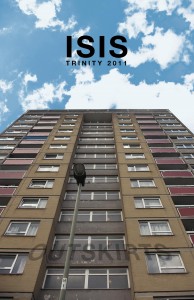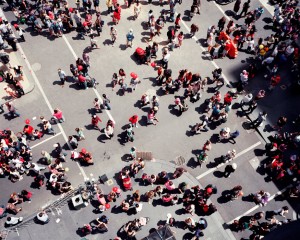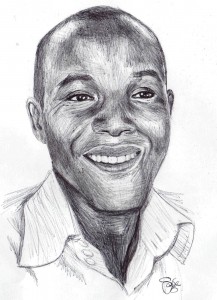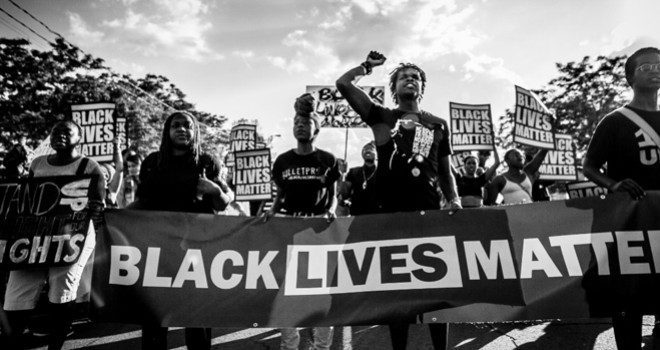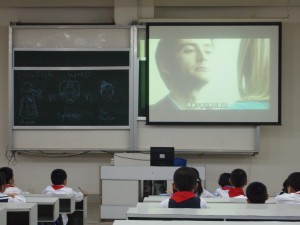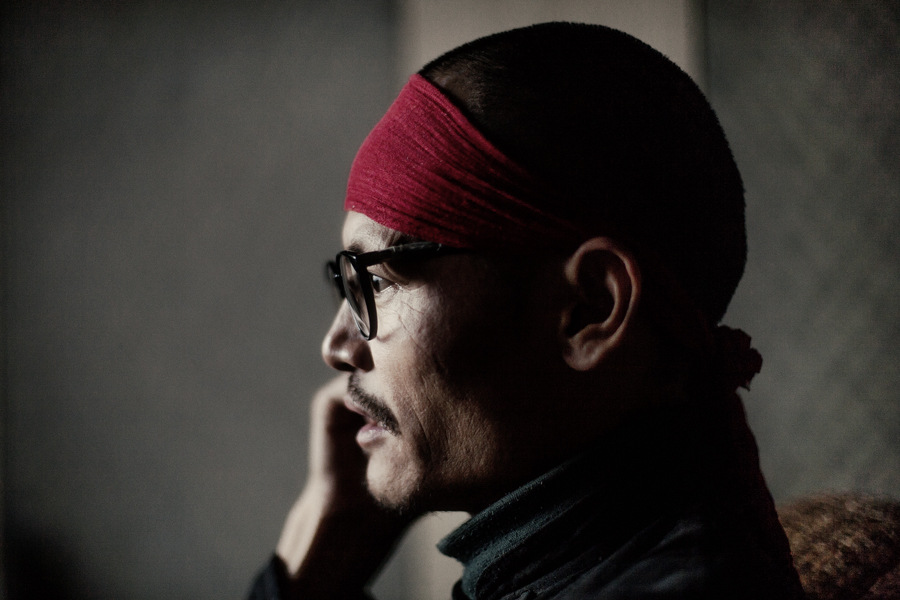
I am a terrorist: an interview with Tenzin Tsundue
by Miranda Hall | April 27, 2014
I have horns
Two fangs
And a dragonfly tail.
I am the humiliation
You gulped down
With flattened nose.
I am a terrorist
Shoot me down.
It is considered bad luck among Tibetans to discuss what will happen when the Dalai Lama dies. Tenzin Tsundue, however, is not afraid of taboos. “If His Holiness passes away before the situation is resolved, I think the Tibetan people will take matters into their own hands. Once the centre disappears, the periphery will be thrown into tumult. Violence cannot be ruled out. China’s greatest fear, chaos, may then truly be unleashed.” Based in Dharamshala, India, home of the Tibetan Exile Community since the 1959 Tibetan Uprising, Tsundue is instantly recognisable for the red bandanna around his head: “A personal symbol of my pledge to work for Tibet every day of my life and never to take it off until Tibet is free.”
Tsundue’s vocal criticism of the long tradition of Buddhist passivity has struck a chord among a new generation of restless Tibetan militants. “The stereotyping of Tibet as Shangri-la, a land of floating Buddhas, is hugely damaging since it does not recognise Tibetans as real human beings engaged in a political struggle.” For the Tibetan independence movement to progress, he argues, we must kill the clichés associating ‘Free Tibet’ with an obsolete generation of ‘spiritual’, flower-child hippies. “But we too have stereotypical notions of the white west as ‘Inji goser’ (yellow-head Westerner) and the Chinese as ‘cowardly worm-eaters’,” he adds with a razor-edged grin.
Tsundue first attracted international media attention in 2002 when he staged a one man protest, climbing the scaffolding outside the hotel where Chinese Premier Zhu Rongji was staying in Mumbai with a banner emblazoned with the words “Free Tibet: China, Get Out.” The act was a protest against the Chinese occupation of Tibet since 1950, under which an estimated one million Tibetans have been killed and 99% of Tibetan monasteries destroyed. Despite being imprisoned and given a travel ban, Tsundue repeated the same stunt in 2005 when Premier Wen Jiabao visited Bangalore. “When I climbed towers in India to protest against visiting Chinese Prime Ministers, journalists always asked me if I was planning to jump to my death. I have lived in prison in Tibet and I know the sense of helplessness, weighed down beneath unimaginable layers of control and power. If I were in Tibet, I would have burned down Chinese infrastructure before burning myself.”
For Tibetan activists, the idea of burning oneself alive is not just rhetoric but reality. In the past three years, 125 Tibetans have self-immolated as a means of political protest. Some of this number were monks and nuns, but many were ordinary people: fathers and mothers, teenagers as young as 16. “Tibet has been isolated from journalists since 2008 and tourists are hugely restricted,” Tsundue explains, “so Tibetans inside Tibet see their world collapsing in silence. To highlight their suffering—having failed with all other methods of protest—self-immolation is a desperate last resort.” Such acts of desperation are the only way of getting one’s voice heard from within Tibet, with its draconian restrictions on the usual platforms for democratic dissent such as the internet. 53 per cent of posts generated in Tibet are deleted, and keyword blocks prevent anyone from searching for the likes of ‘freedom’ or ‘Dalai Lama.’
As we move on to talk about his background, Tsundue is clear about what most shaped his beliefs: “Poverty. It all started with poverty.” Along with thousands of other Tibetan refugees who escaped Tibet in 1959, his parents were highway construction workers. Tsundue was born in a roadside tent, and there is no record of his date of birth.. He describes going to refugee school and realising the scale of the problem when he encountered hundreds of other children who had escaped from Tibet, leaving behind their parents and entire families. “From then on I pledged to be a freedom fighter.”
In Dharamshala, Tsundue was able to feel at home because he was not discriminated against as a ‘Chinky’ but, for him, as for all Tibetans, it is only a temporary home. “It is such a tragedy that the first thing you learned as a child was that you do not belong here and you cannot own anything here.” When he was young, he tells me, their tin roof would leak horribly every rainy season, flooding the house. His father always refused to fix it with asbestos sheets, saying every time: “When we return to Tibet we will have our own house.” He never returned, dying in exile in Karnataka. Tsundue is realistic about the risk of this fate for all refugees: “To be in exile is to live in a state of perpetual uncertainty, dreaming against all reason of return to an unseen homeland.” This is a homeland that in the official, diplomatic world, does not exist.
At the age of 21, “dreaming of revolution and tired of fighting for a country I had never seen”, Tsundue decided to return to his Tibet and crossed the Himalayas alone, covering over 400 kilometres by foot. However, he was arrested on arrival at the Tibetan border by Chinese soldiers who promptly blindfolded him and threw him into prison. “I was tortured, interrogated, humiliated and starved…the six foot cell was like a freezer. I learnt to use my shoes as a pillow on the concrete floor.” Since then he has been imprisoned 14 times. “A great learning curve.” he comments with sarcasm. “I highly recommend jail time for all young people.”
Although he describes himself as first and foremost an activist, Tsundue is also a writer, citing Khalil Gibran and T.S. Eliot among his most important influences. He won the Outlook-Picador non-fiction prize and his collection of poetry, ‘Kora’, has sold over 20,000 copies. “In Tibet, in the clear absence of any Tibetan political leadership, people follow the writers, poets, intellectuals, stand-up comedians, bloggers and musicians. These are our celebrated heroes. That’s why China targets these public figures. Because art has a compulsive habit of policing liars. That is why Liu Xiabo is in jail in China and Chinese dictators are infuriated by the antics of artists such as Ai Wei Wei or bloggers such as Woeser.”
So what exactly does freedom mean to Tsundue? “I have realised that freedom is not an end result but a process, and that even as we fight for freedom I must ask: ‘Am I free from my personal ambitions? From my desires and ego?’ My conviction in Tibet’s freedom is based on the Tibetan people’s belief that our practice of love and compassion is more powerful than Chinese arrogance with its money and brute force. No amount of wealth can buy us out nor any amount of threat silence us in fear. We are already free. We only need to send the Chinese home.”
While Tibet burns, however, the international community seems to be turning a blind eye. On his recent visit to China, Cameron actively distanced himself from the Dalai Lama and reaffirmed the UK’s support of the ‘One China Policy’ (which asserts that Tibet is an ‘inalienable part of China’). For as long as the West continues to play salesman rather than statesman, placing commercial opportunity above moral rectitude, Tsundue faces a solitary mission. The prospect of him ever taking off his red bandana seems disturbingly remote.
I am Tibetan.
But I am not from Tibet.
Never been there.
Yet I dream of dying there.
